Dance Physiotherapy
Opening Hours:
Monday to Thursday 8am-7pm | Friday 8am-6pm
Physiotherapy for the unique demands of every dancer’s body.
Dancers need a unique combination of strength, flexibility, balance, and technique to perform at their best. At different stages of a dance career, it’s essential to be appropriately and professionally assessed, and if injury strikes, it’s equally important to see a physiotherapist who is specially trained in dance-specific rehabilitation.
Ballet, in particular, is one of the most technical and physically demanding forms of dance. Performing on the tips of one’s toes and executing thousands of steps with grace and precision is arduous and challenging. For young ballet dancers, receiving their first pair of pointe shoes is a huge milestone, but pointe work also places extraordinary demands on the body. Years of training, dedication, and discipline go into mastering this art, and without the right preparation and technique, the risk of injury is high.
Humans aren’t naturally built to walk (let alone dance) on the tips of their toes. That’s why it’s vital to make these movements as safe as possible. The International Association for Dance Medicine and Science (IADMS) recommends that young dancers meet specific readiness criteria before progressing to pointe. Using current research and our clinical knowledge, we’ve developed a biomechanical assessment to help dancers advance safely.
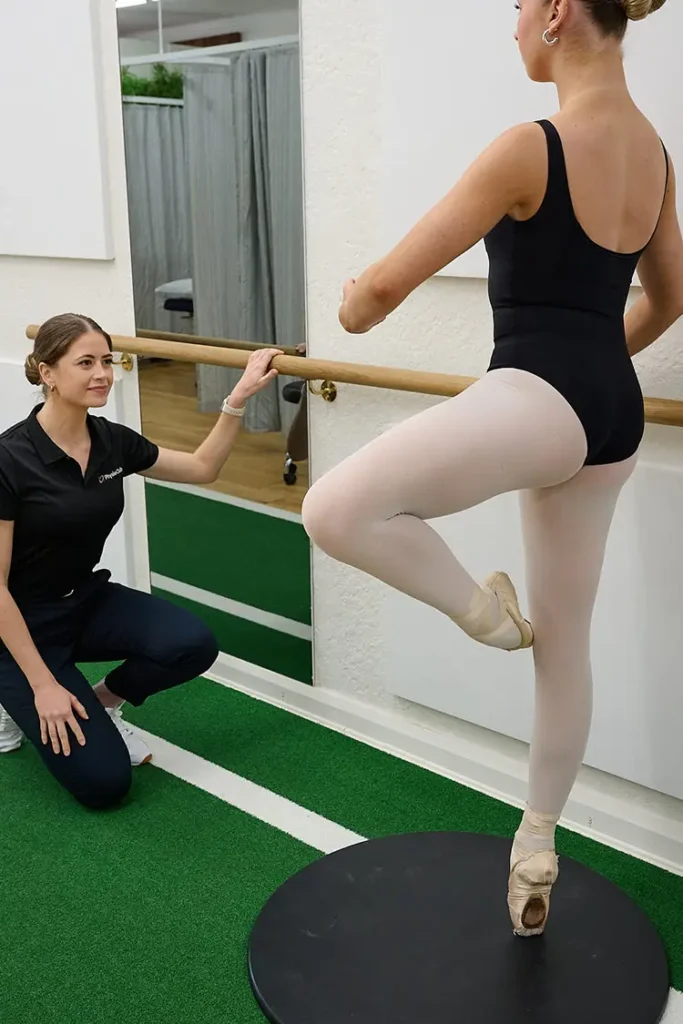

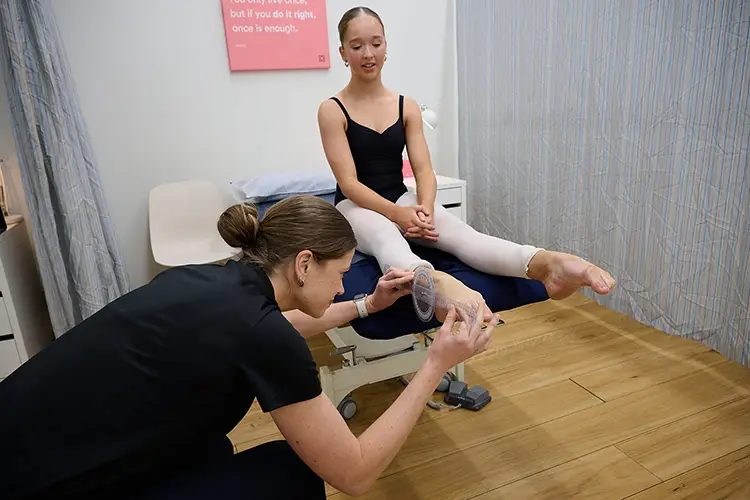

Pre-Pointe Assessment
It is widely recommended that dancers do not begin pointe work before the age of 12. They should train in ballet-specific skills at least twice a week and have 3–4 years of prior ballet experience. This framework builds the cognitive skills, strength, flexibility, and technique required for safe pointe work.
Our Pre-Pointe Assessment includes:
- Foot and Ankle Assessment: Structure, alignment and range of motion.
- Strength Testing: Feet, ankles, legs, and core.
- Flexibility Screening: Feet, ankles, legs, and spine.
- Balance Assessment: Including single-leg stance and relevé positions.
- Technique Evaluation: Posture and alignment in basic ballet movements.
- Comprehensive Report: Clear results and any recommendations, which can also be shared with your dance teacher for further guidance.
Common Dance Injuries
Ankle Sprains – From twisting or overstretching the joint
Stress Fractures – Caused by repetitive impact and load
Achilles Tendonitis – Inflammation and pain in the Achilles tendon
Plantar Fasciitis – Pain from inflammation along the bottom of the foot
Compensatory Injuries – Weakness or restricted movement in the feet/ankles leading to knee, hip, or back problems later in a dancer’s career
Many of these injuries can be prevented with early assessment, correct technique, and targeted strength training.
Additional Dance-Specific Services
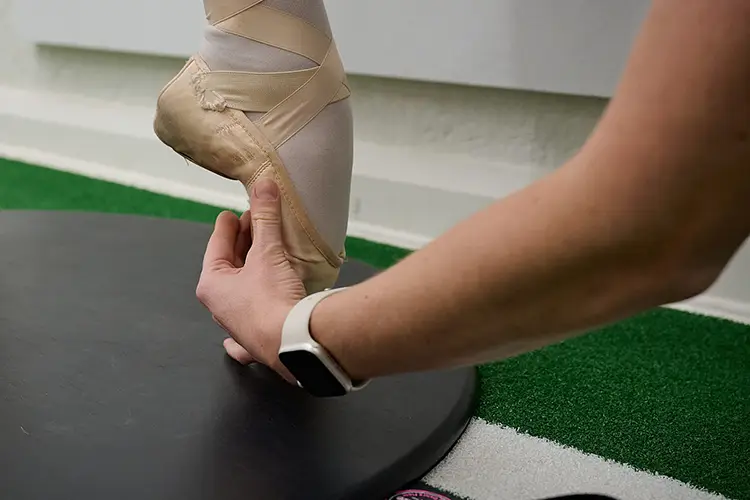

Foot and Ankle Assessment
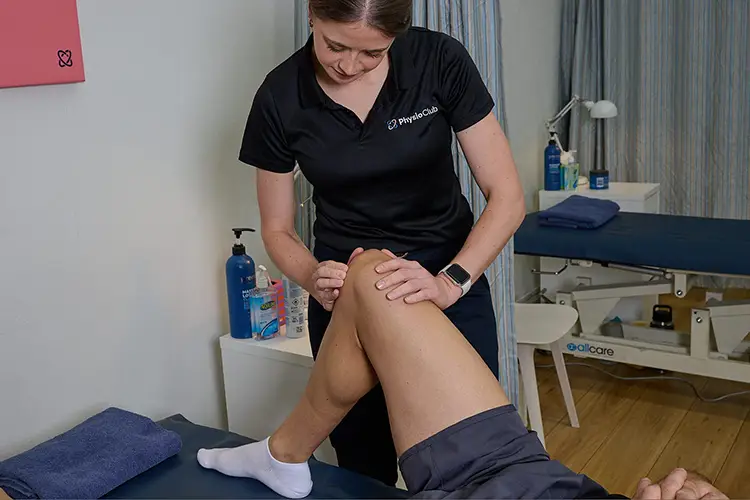

Hip and Knee Assessment
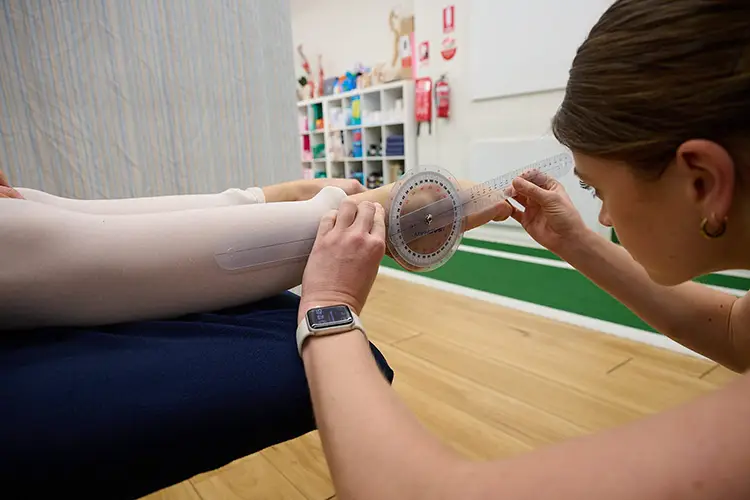

Why Choose Physio Club for Dance Physiotherapy?
Our Dance Physiotherapists combine clinical knowledge with a deep understanding of dance biomechanics. Whether you’re preparing for pointe, recovering from injury, or aiming to improve performance, we work with you, your teacher, and your training goals to keep you dancing pain-free and at your best.
Book your Dance Physiotherapy session with Physio Club today and keep your body moving as beautifully as your art.
Our Services
Through advanced technology, modern equipment, functional testing, and a deep understanding of each client’s history and goals, we go beyond simply treating symptoms. We identify and address the root causes of pain or dysfunction to support a complete recovery and help prevent future injuries.
Our comprehensive services include:
At Physio Club, our mission is to ensure that everyone who interacts with us has a positive, personalised, and professional experience, whether through:
One-on-one consultations
Hands on mobilization & manipulation
Exercise prescription
Biomechanical & strength analysis
Fully equipped rehab gym
Health education services
Warm, respectful and family-friendly environment
Open communication with our supportive, personable & fun team